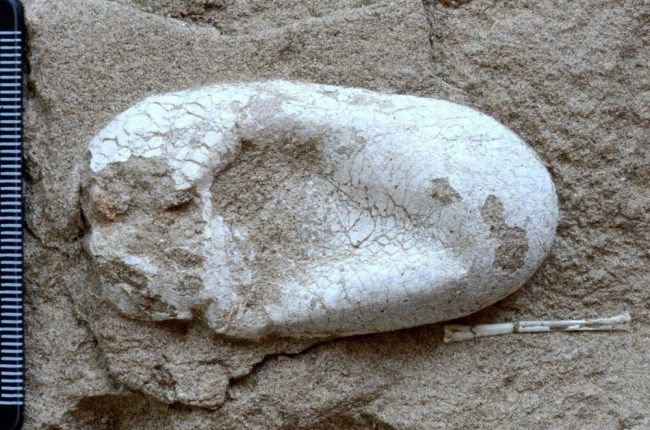Rare 120 Million-Year-Old Pterosaur Eggs Found In China

Five intact eggs belonging to the prehistoric pterosaur, a winged reptile that lived among dinosaurs some 120 million years ago, were found among dozens of fossils that were recently excavated in northwestern China.
The rare find is the first time scientists have unearthed complete pterosaur eggs, researchers from the Chinese Academy of Sciences' Institute of Vertebrate Paleontology and Paleoanthropology announced Thursday. Until now, only four pterosaur eggs have ever been found, but they were all flattened during fossilization.
“These fossils shed new light on the reproductive strategy, ontogeny, and behavior of pterosaurs,” researchers wrote in their report,” published online Thursday in the journal Current Biology.
The team said the eggshells were pliable with hard calcareous exteriors and soft inner membranes, similar to the eggs of some snakes. Researchers say the pterosaurs probably covered their eggs in sand along the shore of an ancient lake to prevent them from drying out.
The pterosaur fossils discovered at the excavation site, located south of the Tian Shan Mountains in the Turpan-Hami Basin, actually belonged to a new genus and species of pterosaur, Hamipterus tianshanensis.
Scientists found more than 40 male and female adult Hamipterus specimens in Turpan, varying in size and shape, with wingspans ranging from 25 centimeters to more than 12 meters wide. The large collection of fossils suggests pterosaurs lived together in large, gregarious colonies.
Pterosaurs are the earliest known vertebrates to have evolved powered flight and lived during the Early Cretaceous period.
This isn’t the first time China turned up a vast treasure trove of prehistoric fossils. In May, researchers discovered a cousin of the famed Tyrannosaurus rex that they named “Pinocchio rex” for its long, slender nose studded with tiny horns.
And in April, scientists discovered fossils belonging to the world’s earliest and most primitive pterosaur, a 163 million-year-old find.
© Copyright IBTimes 2025. All rights reserved.






















